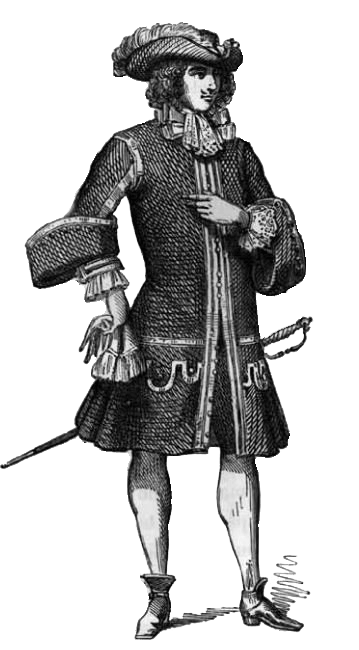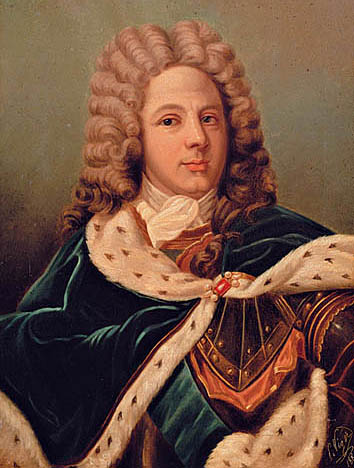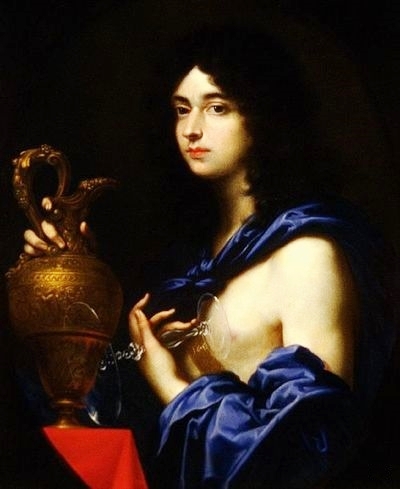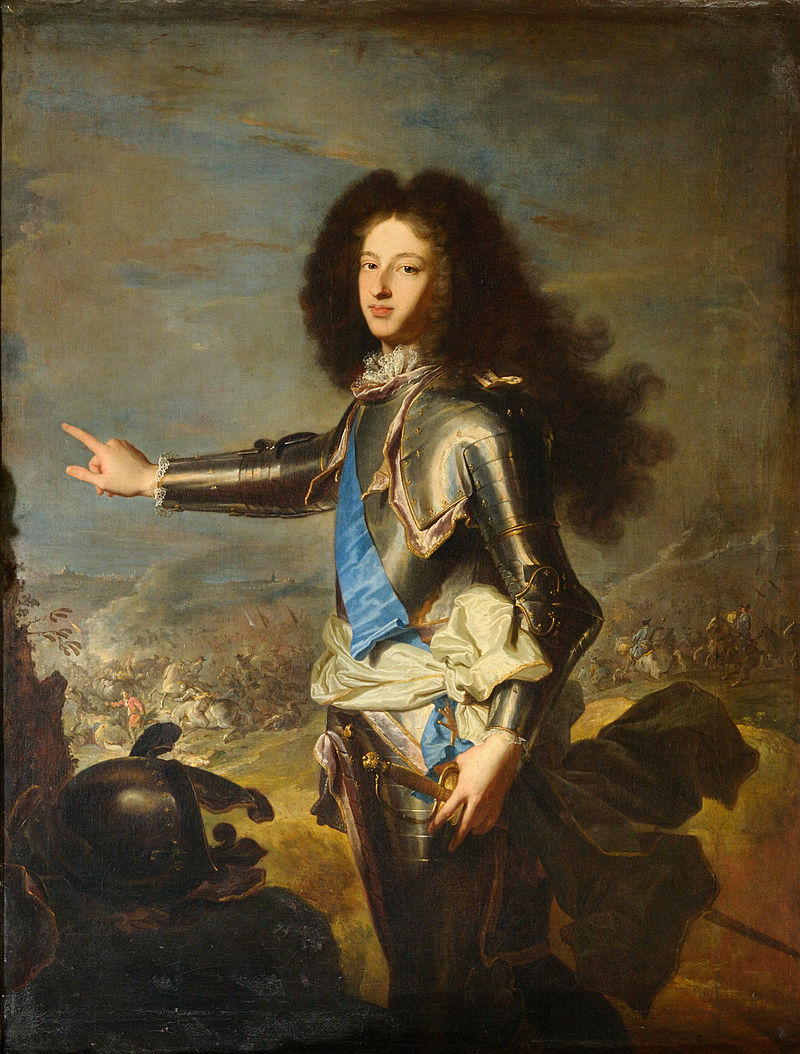Philippe-Jules Mancini, Duc de Nevers
Filippo Giulio Mancini was born on May 26, 1641 in Rome as second son of Girolama Mazzarini, sister of Cardinal de Mazarin, and the Italian aristocrat Lorenzo Mancini. Just like his sisters, he adopted the French version of his name upon being brought to France.
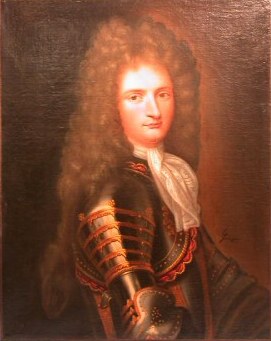
Cardinal de Mazarin had not only just great plans for his nieces, but also for his nephews, Paul-Jules, Philippe-Jules, and Alfonso. He intended that at least one of them should become a close friend to his young protegé Louis XIV, in order to know what this protegé was doing and thinking.
Paul, then aged ten, was the first to be brought to France along with his sisters Laure and Olympe, as well as their cousin Anne-Marie Martinozzi. Paul did as he should, befriended the King and even became Captain of the Chevau-Légers. He seemed perfect for a military career and showed great bravery. This bravery did not vanish during the last fights of the Fronde in the suburbs of Paris, as he was pierced by blades in Saint-Antoine. He died on July 2 in 1652.
A new nephew was ordered to France in 1653. Philippe-Jules arrived as part of the second Mancini contingent along with his sisters Hortense and Marie, their mother and aunt.
He was given into the care of the Jesuits in Paris at the Collège de Clermont. Mazarin intended for Philippe-Jules to become his heir and had high hopes the boy would not disappoint him, but these hopes soon became smaller as the first reports of his nephew’s behaviour reached his ears. Describing him as “disapplied, unpredictable and subject to whim“.
The next nephew, now also bearing the French version of his name, Alphonse, reached Paris shortly after and was given into the care of the same institution as his older brother. During a game, in which the young boys of the Collège de Clermont put him into a blanket and tossed him into the air, Alphonse flew too high. They were unable to catch him again. He hit the cobblestone with his head and died, at an age between twelve and fourteen.
Philippe-Jules left the Collège de Clermont to participate in the coronation ceremony of Louis XIV, by carrying a part of the coronation robe. It made him able to receive the honour of becoming a Chevalier de l’ordre du Saint-Esprit, and only a year later, in 1655, he obtained a commission as an officer and served under Turenne. His bravery and eagerness during the battles made it into a praising sonnet, but Philippe-Jules time on the battlefield was swiftly over. He was wounded at the siege of Conde.
As his Cardinal-uncle decided to restore the Musketeers in 1657, which he had dissolved in 1646, he made Philippe-Jules their captain… but the dashing Philippe-Jules had only little taste for the soldier’s life left and thus let his sub-lieutenant d’Artagnan act captain on his behalf.
The Cardinal’s hopes were finally shattered as his, according to Saint-Simon “very Italian Italian“, nephew turned away from anything military and towards the arts and debaucheries. Declaring himself he does not intend to be a courtier and would much rather engage in any kind of debauchery at least once. He loved to compose verses, in French and Italian, preferably out of the blue, not for any sort of praise and merely for amusement, frequented the Salons of Paul Scarron and Madame des Houlières. Was rumoured to refuse nor male or female. This rumours submerged again in 1658. Philippe-Jules is said to have been the “first to have corrupted Monsieur” and to have “woken gay feelings” in Louis XIV’s younger brother Philippe, most likely on the behest of Cardinal de Mazarin.
Anne d’Autriche removed him from the presence of her son shortly after and Philippe-Jules was accused of having brought the Italian vice to France. He did care little and moved on the next debauchery.
It lasted for several days during the Holy Week in 1659 on the estate of the Comte de Vivonne. The participants, Roger de Bussy Rabutin, Armand de Guiche, Bernard de Manicamp, the Abbé le Camus and others, held a “Black Mass”. On Good Friday, they ate a suckling pig, which had been “baptised” as a carp by the Abbé. This meal was accompanied by plenty of gossip about the young King and his court. Talking servants carried the tale to Paris and the happenings reached the ears of the court shortly after, by then exaggerated to talk of human flesh having been eaten.
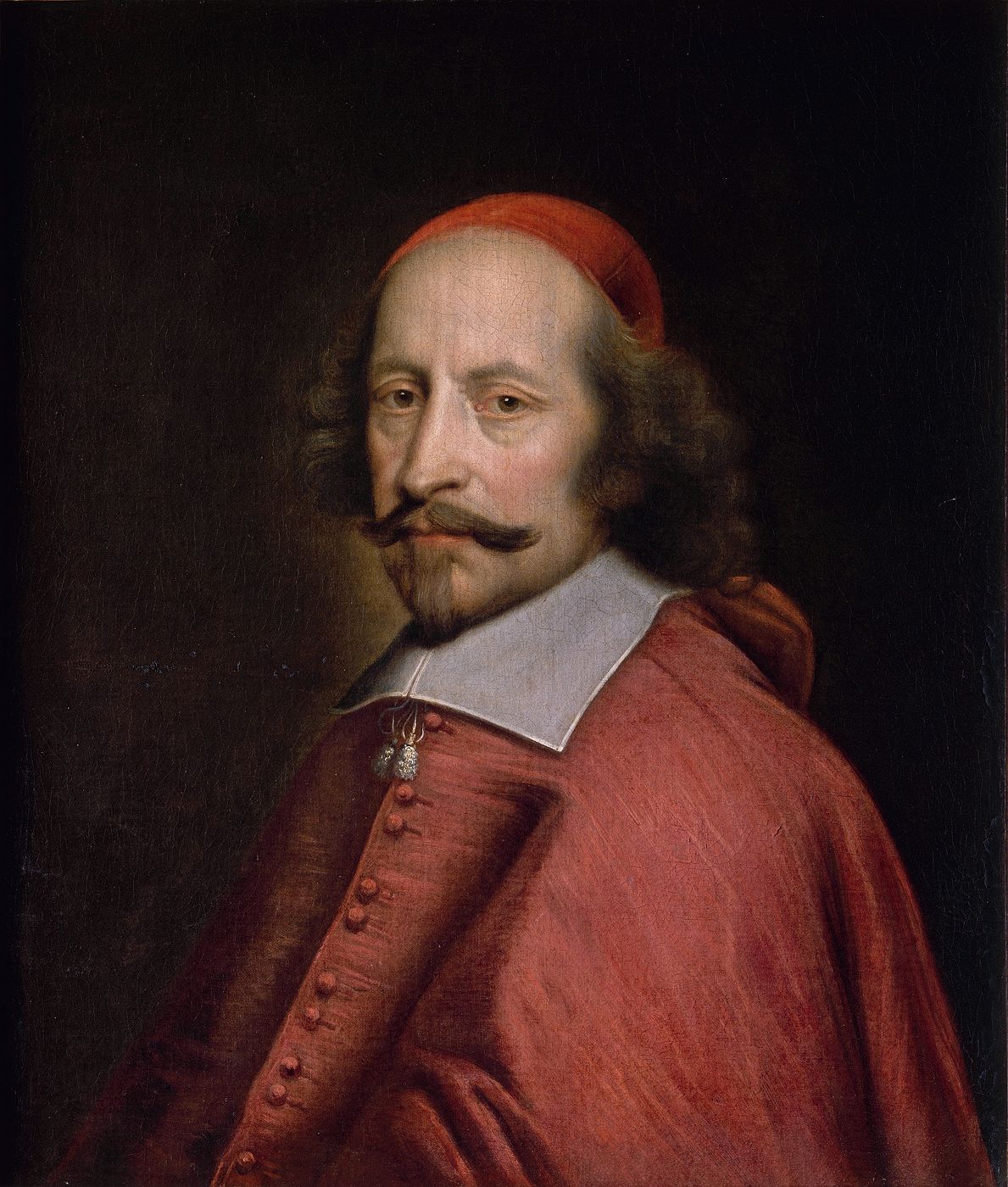
The participants were sent away from court and Philippe-Jules to the Fortress of Brisach, close to the German border, as punishment. His attempt to flee the Fortress in August, was noticed and he captured during the attempt. The Cardinal ordered him to learn German, a language he did not like, and the Gouverneur de Brisach, on the orders of Mazarin, forced him to get up early to exercise at arms and study, something he enjoyed even less. Bussy-Rabutin ensured the Cardinal that Philippe-Jules had just been in Roissy for one day, and then left again, and had not engaged in any orgies, but the Cardinal found it hard to believe. Philippe remained at the German border.
Mazarin thought his nephew to be “too independent, without ambition, and distracted by his poetry“, which was not helpful for his own ambitions…. and thus Philippe Jules was not released until one year later to attend the wedding of Louis XIV, who was still madly in love with Philippe-Jules sister Marie.
In the same year, Philippe-Jules was nominated to be Duc de Nevers and Donzy by Cardinal de Mazarin, with the prerogative to strike coins. The Parlement de Paris, however, refused to register this new creation, since it came with a peerage. Mazarin had bought the Duchy from Louis de Gonzaga in 1565 and had transferred the Duchy of Nevers, as well as the Duchies de Mayenne and Rethel and the Baronnie de Donzi to himself. Upon the Cardinal’s death in 1661, Philippe-Jules however inherited the Duchy of Nevers, along with the Governments of Rochelle and Aunis, the Hôtel de Nevers in Paris and the Palais de Monte Cavallo in Rome. The major part of the Cardinal’s wealth went to his sister Hortense. Mazarin found Philippe Jules not worthy to be his heir, which he thanked him thus with the words “Finally, he is dead!“.
Said to have a “very quick tongue and a very cold heart”, Philippe-Jules was welcomed into the Ordre du Saint-Esprit, the senior chivalric order of France by precedence, the same year, although his relationship with the King was tense at this time. He left France in the following year, now a rather wealthy man and Duc, to visit his sister Marie in Rome and enjoy the pleasures Venice offered. Philippe-Jules did not return to France until a year later and for once led a quiet life, for his standards. In 1667 he finally resigned as Captain of the Musketeers and the office was passed to Charles de Batz-Castelmore, Comte d’Artagnan.
This relatively quiet and poetry centred life was over in 1668, as Philippe-Jules helped his sister Hortense to escape the wrath of her mentally unstable husband, by arranging for her to flee Paris unseen in the safe company of his friend the Chevalier de Rohan. Hortense fled to Lorraine and from there to Rome, where Philippe-Jules joined her shortly after and stayed for nearly three years… until Madame de Montespan decided Philippe-Jules is the perfect groom for her niece Diane-Gabrielle de Damas de Thianges, very pretty but without a penny. Her becoming Duchesse de Nevers would be the solution for this problem and word was sent to Rome. Philippe-Jules agreed, but without being in a hurry to return to France. Rome is just too pleasant, his sisters Marie and Hortense are there, and now the exiled Chevalier de Lorraine as well.
The flirting of the latter with Marie, makes her married life not easier, and thus it is decided, after the first odd remarks of her husband considering Marie’s health, which made her fear for her life. Marie and Hortense must leave Rome for France. Philippe-Jules asked for allowance to bring Hortense, who is undeniable pregnant and that not from her husband, and Marie with him. It is surprisingly approved. The sisters remain in Rome for a little longer, to avoid suspicion, and their brother travelled ahead to Monaco. The Chevalier de Lorraine, who wanted to join the three in first, was unsure whether it would make is situation worse or not. He decided against joining them left for Neapel instead. Marie and Hortense left for Frascati, officially to take the waters there, but met Philippe-Jules in Monaco instead and the three of them travel slowly towards Paris. Once again on French soil, they were greeted by rumours spread by Hortense’s husband, stating the child she had given birth to during their travel was fathered by Philippe-Jules and that he would love his sisters more than a brother should. Oh la la.
 The King put a swift end to this gossip by ordering the cause of the talk to keep his mouth closed. The marriage of Philippe-Jules and Diane-Gabrielle de Damas de Thianges took place with regal splendour in the Chapelle Royale du Palais des Tuileries on December 14 1670.
The King put a swift end to this gossip by ordering the cause of the talk to keep his mouth closed. The marriage of Philippe-Jules and Diane-Gabrielle de Damas de Thianges took place with regal splendour in the Chapelle Royale du Palais des Tuileries on December 14 1670.
The new Duchesse was barely fifteen, shy and an extraordinary beauty of great charm, and introduces a new hairstyle. La coiffure en hurluberlue, worn flat on the top of the head and curly on the sides. Philippe-Jules habits did not change after his wedding, although he became swiftly enamoured with his bride, he still continued to travel to his other and perhaps greater love, Rome, much to the annoyance of Louis XIV.
“….sometimes he entered the bedroom of his wife in the morning, to make up right away, and to call for his coach, without any of his man expecting something or being prepared, then to Rome, without him thinking to go there just four days ago. “- Saint-Simon
The Duc de Nevers was an elusive and unpredictable man, Italian by birth, French by title. Louis XIV wished for Monsieur le Duc and more importantly Madame la Duchesse to be present more often in Paris. He had an eye on the beautiful Diane. Madame de Sevigne and Madame de Caylus whispered in their letters about it, and indeed, Madame de Montespan, when seeing her favour declined, tried to place her niece in the bed of the King to “keep it in the family”. At this point however, the eyes of the King had already turned to the beautiful Angélique de Scorailles, Mademoiselle de Fontange, another hairstyle inventor.
Now it was the turn of Henri-Jules de Bourbon, to fall in love with the young Duchesse. Well aware that, in order to see Madame de Nevers, he first had to coax the husband, he had the idea to give a party at Chantilly. He asked Philippe-Jules to see to the entertainment, claiming that his own poet made the Prince look bad. Philippe-Jules, poet at heart, did not need to be asked twice, and agreed to perform the task with good grace. The laughter aimed at the cheated husband was great and he did react as only he could…
“Monsieur de Nevers, all jealous, all Italian, all witty, first had not the slightest suspicion, but a few days before the party at Chantilly, he discovered what it was, he said nothing, and went to Rome with his wife on the next day, where he remained long.” Saint-Simon
In 1667, a sonnet believed to be written by Philippe-Jules lead to the “l’affaire des sonnets“, an exchange of poetry between enemies and friends of Racine about his play Phaedrus. Authorship of the sonnet that triggered the war was attributed to the Duc de Nevers. The first tercet ,after which the fight took more vivacity, was not only a rather delicate joke about an actress, the big and blonde Anne Ennebaut, the great grand-daughter of Montfleury and woman of Desmares, it was also a hint of reproach of Racine’s Hippolyte about making love without reason or plausibility.
Racine and his friends, the Comte de Fiesque, Marquis de Manicamp and Marquis d’Effiat, along with the Chevalier de Nantouillet, suspected the pen of the Duc de Nevers, and answered in sonnet form as well. It was a thinly disguised attack on his sister Hortense fleeing her husband and traveling though the world, along with mentions of an incestuous relationship between her and Phillippe-Jules. In turn he promised to Racine and his friends to make them succumb and forced Racine, Boileau and his friends, to hasten to declare that they are not the authors of the libellous rhymes. They approached the Grand Condé, enemy of the Mazarin family, who welcomed them in his Parisian Hôtel to offer asylum. Racine and Bouleau swiftly claimed the Comte de Fiesque, the Marquis d’Effiat, Guilleragues and de Manicamp have been the authors, while they themselves had nothing to do with it. A third sonnet followed, ridiculing both Racine and Bouleau for their cowardy. The sonnet war ended after le Grand Condé once again called both sides to calm and declared for Racine again. The anger of the Duc de Nevers did eventually subside, and he reconciled with Racine.
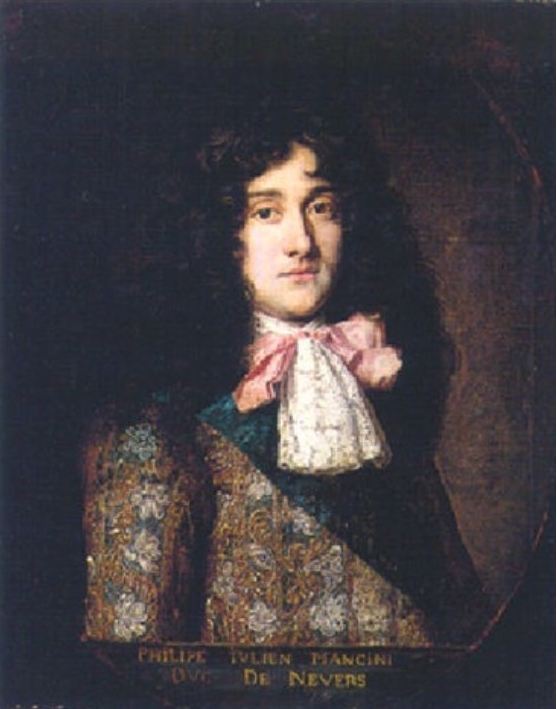
Being very handy with the quill, Philippe-Jules wrote libretto for the opera “Nicandro e Fileno” by Lorenzani in 1681. Saint-Simon calls it the “prettiest of the world” and Voltaire says in his Age of Louis XIV: “He is a unique author, we hear with ease and great pleasure.“. Molière was suspected of having caricatured Philippe-Jules in form his character of Orontes in the “Misanthrope”. Philippe’s works were difficult to obtain, and mostly just seen by his friends. Madame de Sevigne complains of this in a letter to Monsieur l’abbé de Coulanges: ….Bring me the poems of Monsieur de Nevers: they are of singular taste and statement, one can not help but dislike the care he takes to hide them so cruelly. What! You are admitted to the sacred mysteries of this solitary household! I admire you for having dared to attack the caprice of the husband and the delicacy of the woman. I knew she was adorable, but I confess I did not know she was for you….. your letters have always been accompanied by Monsieur de Nevers works, which I have a small collection of, that I would not give for much money …
The Duc de Nevers is the author of several writings, in French and Italian, poems and sonnets, many of them inspired by his favourite muse, his wife.
Six children were born to them: Eloy Mancini (died young); Gabriel Mancini, Duc de Donzy (died in May 1683); Diane Gabrielle Victoire Mancini (1672–1716), who married Charles Louis Antoine de Hénin-Liénard, prince de Chimay; Philippe Jules François Mancini (1676–1769), Prince de Vergagne et du Saint Empire, then Duc de Nevers; Diane Adélaïde Philippe Mancini (1687–1747), who married Louis-Armand, Duc d’Estrées; Jacques Hippolyte Mancini (1690–1759), who in 1719 married Anne-Louise de Noailles (daughter of Anne Jules de Noailles), with their only child being Marie Diane Zéphirine (1726–1755), who married Louis-Héracle de Polignac. They are ancestors of Albert II of Monaco through their grandson, Jules François Armand de Polignac.
On May 8 1707, Philippe-Jules died slowly at the Hôtel de Nevers in Paris, at the age of sixty-six. He did not have the chance to see his favourite daughter, Diane Adelaide Philippe, who he affectionately called Api, wed the Duc d’Estrées a few months later. His body was buried in the church of the Collège Mazarin and his heart at the Cathédrale de Nevers.
Philippe neglected to register the patent he obtained for the title Duc de Nevers in 1678, the deadline to do so being ten years, thus his son Philippe Jules François Mancini could not inherit the title of Duc de Nevers. He held the title Duc de Vergagne, which he inherited from his father in law, and received the nickname “Duc de Vergogne”-“Duke of Shame”- during the Regency. He did obtain the title of Duc de Nevers in 1720, after having it registered by the Parliament, and resigned in 1730 in favour of his son. This son, Louis-Jules Mancini Mazarini, became one of the most charming men of the eighteenth century. A poet, diplomat and nobleman like his grandfather.


